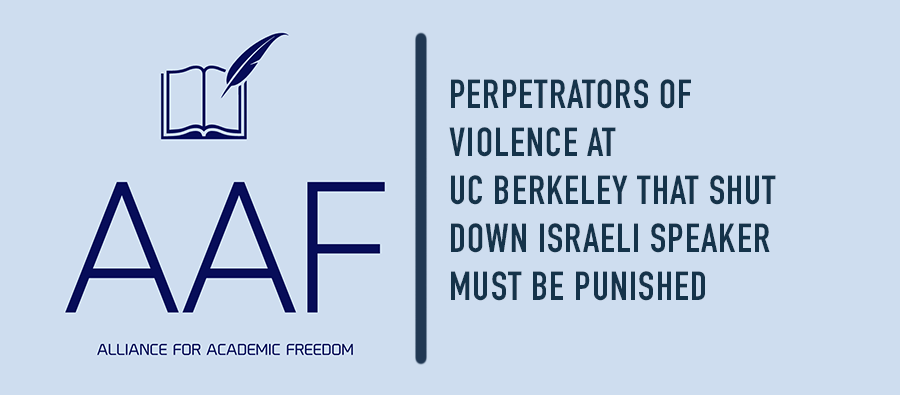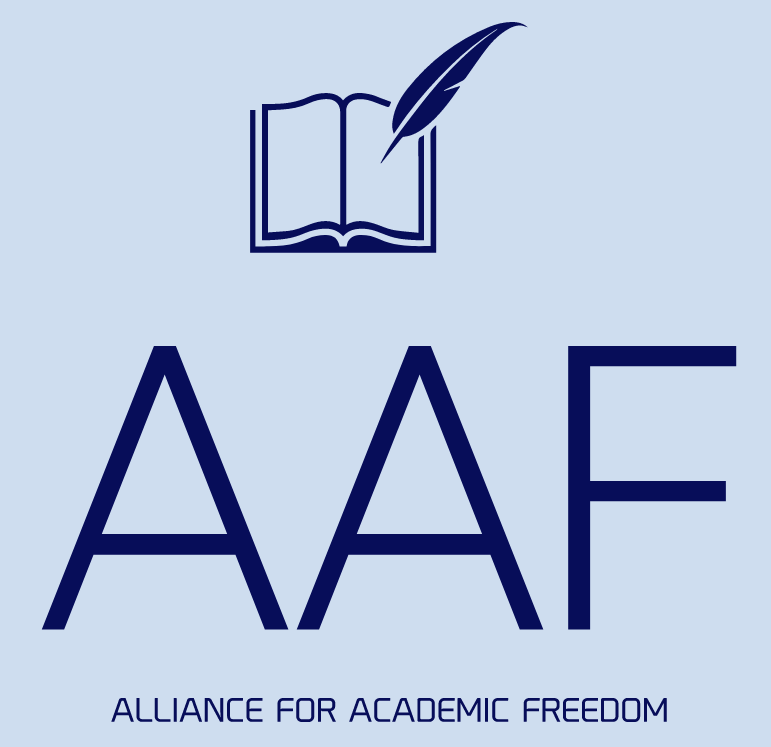By members of the Alliance for Academic Freedom Executive Committee: Cary Nelson (Chair), Susana Cavallo, David Greenberg, Rebecca Lesses, Jeffry Mallow, Stan Nadel, Ken Stern.
On February 26, 2024, a violent mob of roughly 200 people, apparently organized by the University of California, Berkeley student group Bears for Palestine, used force and the threat of force to prevent a talk by Israeli attorney and policy analyst Ran Bar-Yoshafat. According to news reports and the office of the Berkeley chancellor, Bears for Palestine had announced its plans to shut down the talk on Instagram the previous day and called for people to join the action.
On Monday night, a crowd chanting “Long live the intifada” and “Killers on campus” marched to Zellerbach Playhouse, where Bar-Yoshafat was to speak. They surrounded the building, banging noisily on doors and chanting with bullhorns. Some protesters did battle with the campus police, stormed the building, broke windows and a door, and entered without authorization. At least two students report having been assaulted and others report being spat upon and called antisemitic slurs. In the building, Jewish students had to use internal stairs and an underground tunnel to sneak away to a secret location for their physical safety. The university and the police decided that under those conditions the event could not go forward safely.
The Alliance for Academic Freedom, which supports free speech and open debate on campus surrounding the Israeli-Palestinian conflict, unequivocally condemns the student rioters and calls on the university to punish both Bears for Palestine and the individual students who were involved in shutting down the event.
We uphold the right to protest peacefully, even in ways that may be deemed offensive. But the resort to physical force, or to the use of overwhelming numbers of protesters to stop an event, is never permissible. It violates not only the free speech rights of the speaker but also the rights of all those who wished to hear him. Further, it is inimical to the spirit of open inquiry that is at the heart of the university’s educational mission. Moreover, it appears that Bar-Yoshafat was targeted on the basis of national origin. The University of California, Berkeley has an obligation to investigate and take action against the perpetrators, both as a matter of justice and to affirm that violent mob action will not be tolerated as a form of political protest.
Since the Hamas massacres of October 7, 2023, there have been numerous incidents on campuses in which one party has tried to limit the free expression of the other. Indiana University canceled a retrospective of the Palestinian-American artist Samia Halaby. External organizations have doxed pro-Palestinian students on some campuses. Those actions have been surpassed by frequent, almost commonplace disruptions of Jewish or pro-Israel speakers or events on numerous campuses. Antisemitic speech by students, faculty, and others has also soared. The AAF criticizes all of those efforts as inimical to free speech and academic freedom.
Mob violence on campus amounts to a threat of an even more severe kind. In mid-February, at San Jose State University, a student protest that turned violent forced the police to escort away Jeffrey Blutinger, the director of Jewish studies at Cal State Long Beach, who was speaking about a two-state solution to the conflict. Other campuses have also seen anti-Israel incidents marked by violence or threats of violence.
The siege at Berkeley, which marks a dangerous escalation in anti-Zionist and antisemitic campus politics, constitutes a warning to the entire higher education community. In the coming months, tensions around the Israel-Hamas war are likely to remain high. Protests of various kinds will continue. It is essential that university presidents and leaders everywhere take strong steps to convey that a range of voices are welcome on campus and that mob action to silence speakers will be met with serious punishment.
Alliance for Academic Freedom
